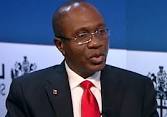 About N400 billion bad debt outstanding in the banking sector is causing panic in the industry and most of the debtors are individuals who have the capacity to pay but have refused to do so.
About N400 billion bad debt outstanding in the banking sector is causing panic in the industry and most of the debtors are individuals who have the capacity to pay but have refused to do so.
Following this development, the Central Bank of Nigeria, CBN, and Deposit Money Banks in the country have concluded plans to publish the list of such debtors starting from August 1, 2015.
The decision to publish the list was arrived at yesterday after the bankers rose from the 322nd Bankers’ Committee meeting in Abuja with a resolution that the names of all serial bank debtors be published latest August 1, 2015
Banks to publish names of debtors
She said: “You will recall that at the last Bankers Committee meeting, we discussed about publishing the names of serial debtors of banks. We discussed this again because of the fact that the date is drawing close. Last time we had the meeting, we said that there should be three months of grace to give the debtors the opportunity to put the facilities back to performing status.The CBN Director of Banking Supervision, Mrs Tokunbo Martins, said banks had been given August 1 deadline to publish names of their debtors. Martins disclosed this while briefing journalists on the outcome of the 322nd Bankers Committee meeting in Abuja.
“So, by August 1, any debtor that hasn’t done so, the name will be published by the bank. So, the banks are encouraged to speak to their customers that fall into that category that they should put in more effort to pay off.”
N14trn total credit
Martins said the total credit currently in the system was between N13 and N14 trillion and about three per cent of it was non-performing. That implies that about N400 billion is the amount that is non performing. She stressed that banks had an upper limit target of five per cent.
12.5m customers enrolled on BVN
On the electronic banking space, Chief Executive of UBA, Mr Phillip Oduzua, said 12.5 million customers had been enrolled on the Bank Verification Number (BVN) exercise.
He said: “We believe that this is a substantial mileage that we have made and there is still room to close the gap knowing that the deadline for everybody to enrol is June 30. In the event that any customer is not enrolled, it is possible that the customer may not be able to enjoy a lot of the banking services.
“As such, we will urge all customers of banks to enrol so that they would continue to enjoy unhindered services from the banks.”
According to him, customers who fail to enrol may not enjoy credit facilities, foreign exchange services and internet banking, among others.
On cashless policy
On cashless policy, Oduoza said with the progress made so far, the policy would be extended to every part of the country before the end of third quarter.
On the foreign exchange market, Mr Jubril Aku of Ecobank said the committee reviewed the sector and would continue to partner CBN to meet legitimate needs of customers.
He said: “There are some demands that raised concerns. So sometimes when such request are made, we make analysis and see the effect on the economy. As long as they are legitimate demands, we will make sure it is met. So, the committee is satisfied with the stability attained and will continue to look at the sector critically.”
Mr Henry Semenitari, Chief Executive Officer of Unity Bank, said the committee also reviewed the enhancement witnessed in the credit culture in the sector. He said the culture would now be extended to other financial institutions of Insurance and non-banking institutions within the banking space.
He said: “As the culture continues to improve, the requisite data that will lead to uninformed judgement in terms of given credit to businessmen will become easier and control effective.
“So, what we will require or implore people to do is to provide the necessary Know-Your-Customer (KYC) to their banks to ensure they are registered through the credit registry as well as other banking and non-banking financial institutions.”
Semenitari said this would help to stabilise and institute a sound culture of credit that would be relevant to the economy and in consonance with financial inclusion policy.
– See more at: http://www.vanguardngr.com/2015/06/panic-over-n400bn-bad-debt-owed-banks/#sthash.jzMlCIvK.dpuf


After publishing their names, what next? Will it clear the debts? The banks should stop deceiving members of the public because many of their top-tanking officials compromised and are therefore culpable in this fraud against hapless shareholders, some of whom have invested their life savings to acquire stocks in these banks. This attitude is capable of reading shareholders’ confidence in the banking institution if not checked.
good morning uncle jimmy, this has been done in the past and no positive result was achieved.